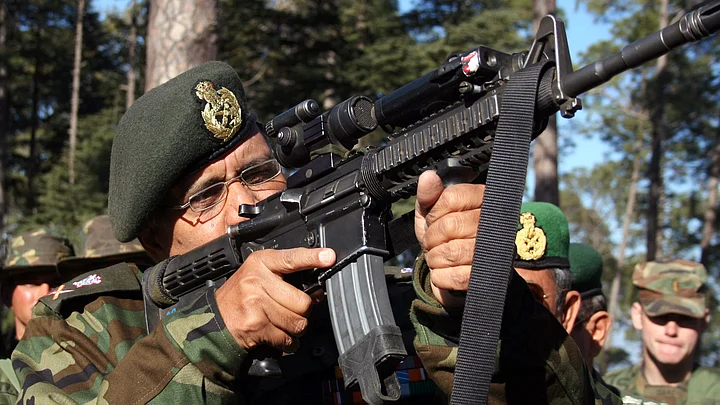Civil-military relations in India, instead of stabilising with experience, continue to deteriorate with little or no effort to learn from other democracies. The OROP saga was an opportunity for the government to address the eroding relations, and win the hearts and minds of the agitated veterans.
The deterioration caused by earlier governments could not be arrested or remedied by the present leadership, despite displaying a resolve to end the long-pending imbroglio related to OROP.
India’s civil society, prior to independence, was quite aware of the vital role played by a soldier. The awareness was primarily created by the fact that large number of Indian soldiers fought in both the world wars, albeit under the British flag. The sheer numbers of Indian lives lost, coupled with the gruesome battles after which surviving soldiers returned to narrate their stories, played a significant role in bridging the knowledge of hardships faced by the soldier.
- When Field Marshal Sam Manekshaw passed away on 27 June 2008, the govt depute only the MoS Defence to be present at the funeral.
- When war veterans fought for their legitimate arrears and even had a court ruling in their favour, there was no response from civil society or elected leaders.
- The OROP saga was an opportunity for the government to address the eroding relations.
- There have been signs of neglect and indifference towards the military from the apex level of governance.
Signs of Neglect and Indifference
Despite the absence of print and electronic media, the relatively smaller populace, though illiterate and abysmally poor, understood the vital role of a soldier and the need to care for him whilst in service and after retirement. However, the scene changed rapidly after independence, leading to continuous erosion in the status of the soldier, which in turn has brought him on the streets to fight for his legitimate rights and dues.
Although there have been signs of neglect and indifference towards the military at the apex level of governance, some recent examples are worthy of note.
First, when Field Marshal Sam Manekshaw passed away at Coonoor, near Ooty on 27 June 2008, the government thought it relevant to stick to existing protocol and depute only the minister of state for defence to be present at the funeral. No one in MoD cared to update the protocol for a field marshal, leave alone a national hero. To top it all, it was only when then President APJ Abdul Kalam raised the issues of pending pay and allowance for the hero (a field marshal never retires), it was rushed to him at the military hospital, prompting him, in his characteristic manner, to ask the cheque bearer whether the Rs 1 crore cheque was likely to bounce!
Have We Deserted Our Soldiers?
Second, when war veterans fought a running battle for their legitimate arrears which were denied for decades, and even had a court ruling in their favour, there was neither a response from civil society, nor from the elected leaders.
This is the very office which issues a commissioning parchment to every commissioned officer of the Indian armed forces.
Fast forward a bit and you come to the two most demeaning incidents, involving the president’s secretariat and the PMO. When the ongoing rift over OROP, despite the apparent resolution, was getting uglier by the day, four former armed forces’ chiefs thought it necessary to write to the Supreme Commander.
Escalating OROP Was Unfortunate
This is the first time in the history of independent India that retired service chiefs have jointly written to the president to seek his intervention. Not only was there no response, leave aside an acknowledgement, it took an RTI from a retired activist to unearth the nature of action taken by the Rashtrapati Bhavan staff.
After repeated reminders, 40 days later, the activist was informed that the letter had been forwarded to the prime minister’s office soon after its receipt. What role the president played in merely passing on a letter written by the distinguished chiefs to the PMO is not known.
The Supreme Commander appears to have merely expressed his inability to be even a titular head of the armed forces.
Soon, another set of retired chiefs released a copy of their appeal on the same subject to the prime minister. Nothing was heard till the same activist pursued the RTI route. After sixty three days the PMO merely stated that such a letter was never delivered to them.
Official Apathy Should End
While some may suggest that the PMO should have acted on the press release by making enquiries from the affected parties, technically no action is warranted without a copy of a correspondence, as media reports could well be fabricated. However, the letter sent from the president’s office was not even acted upon on the grounds that the announcement of OROP had been made by the Defence Minister, whose press conference succeeded in adding fuel to fire.
Equally, the act of releasing the letter to the media without delivering the original to the concerned office cannot be condoned.
These examples are more than adequate to summarise the present levels of indifference and apathy towards the military.
Viewed in the context of a recent media report that the three serving chiefs have jointly represented on the injustice done by the Seventh Pay Commission, this undesirable and potentially dangerous state of affairs must end sooner than later.
(The writer is a former Flag Officer Commanding-in-Chief, Southern Naval Command)
